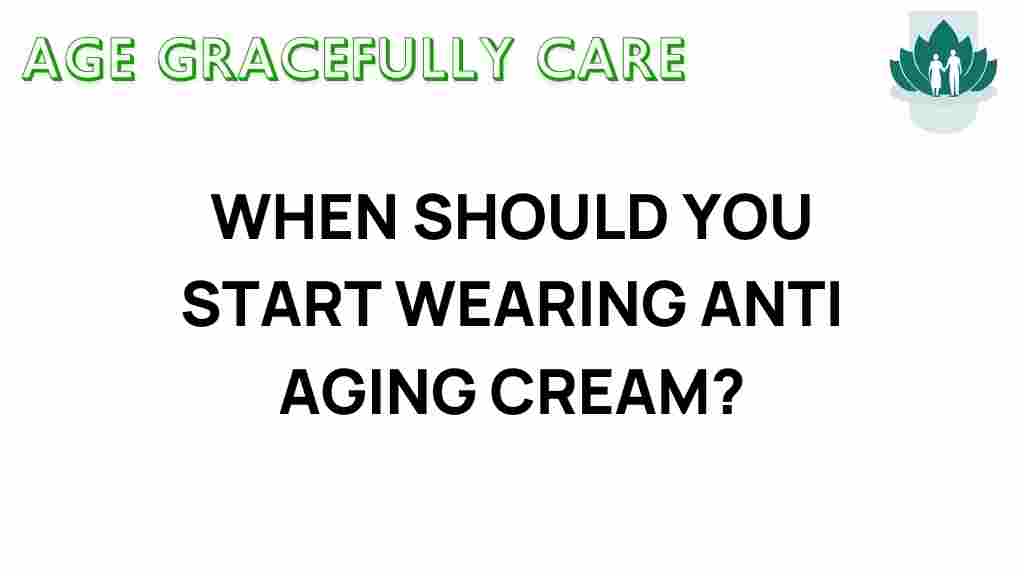The Age-Defying Dilemma: When to Start Using Anti-Aging Cream
In a world where the quest for youthful skin is often at the forefront of beauty discussions, the use of anti-aging cream has become a pivotal point in many skincare routines. However, with the plethora of options available today, many are left wondering: when is the right time to start incorporating these products into our daily regimen? This article explores the age-defying dilemma, offering insights on the best age to start using anti-aging creams, how they work, and tips for maintaining skin health as we age.
Understanding Anti-Aging Creams
Anti-aging creams are formulated to address and prevent the signs of aging, including wrinkles, fine lines, and loss of elasticity. The primary ingredients often include:
- Retinoids: These are derivatives of vitamin A that promote cell turnover and collagen production.
- Hyaluronic Acid: Known for its hydrating properties, it helps maintain skin moisture.
- Peptides: Short chains of amino acids that stimulate collagen and elastin production.
- Antioxidants: Ingredients like vitamin C that protect skin from free radicals.
Understanding these components is crucial for selecting the right anti-aging cream tailored to your skin’s needs.
When Should You Start Using Anti-Aging Cream?
Experts suggest that the ideal age to start using anti-aging cream is in your mid-20s to early 30s. Here’s a detailed breakdown:
- In Your 20s: Your skin is generally youthful and resilient. However, starting a preventative skincare routine with basic moisturizers and sun protection can help maintain your skin’s health.
- In Your 30s: This is often when the first signs of aging appear. Incorporating anti-aging creams with retinoids or antioxidants can help combat early wrinkles and promote skin vitality.
- In Your 40s and Beyond: As collagen production declines, more intensive anti-aging products may be necessary. Consider creams that focus on wrinkle reduction and skin firming.
The Role of a Skincare Routine in Age Prevention
Integrating an anti-aging cream into your skincare routine is just one aspect of age prevention. Here are essential steps to consider:
1. Cleanser
Start with a gentle cleanser to remove dirt and makeup without stripping your skin’s natural oils.
2. Exfoliation
Use a chemical exfoliant, such as AHAs or BHAs, once or twice a week to promote cell turnover and keep your skin glowing.
3. Toner
A toner can help balance your skin’s pH and prepare it for better absorption of subsequent products.
4. Anti-Aging Cream
Apply your chosen anti-aging cream according to the product instructions. Make sure to focus on areas prone to wrinkles, like the forehead, around the eyes, and mouth.
5. Moisturizer
Follow up with a moisturizer to seal in hydration and create a barrier against environmental stressors.
6. Sunscreen
Daily sunscreen is crucial for preventing premature aging and protecting your skin from harmful UV rays.
Beauty Tips for Youthful Skin
In addition to using an anti-aging cream, here are some effective beauty tips for maintaining youthful skin:
- Stay Hydrated: Drinking enough water keeps your skin hydrated from the inside out.
- Healthy Diet: A balanced diet rich in fruits, vegetables, and healthy fats can promote skin health.
- Regular Exercise: Physical activity improves blood circulation, which can enhance skin appearance.
- Avoid Smoking: Smoking accelerates skin aging and can lead to premature wrinkles.
- Manage Stress: High stress levels can negatively impact your skin, so practice relaxation techniques.
Consulting with a Dermatologist
For personalized advice, it’s best to consult a dermatologist. They can assess your skin type and recommend appropriate products for your specific needs. Understanding your skin’s unique requirements is essential for effective age prevention and overall skin health.
For more information on skincare and dermatology, check out this link to expert resources.
Troubleshooting Common Issues with Anti-Aging Creams
Even with the best intentions, you might encounter some issues while using anti-aging creams. Here are some common problems and their solutions:
1. Irritation and Redness
If you experience irritation, it may be due to potent ingredients like retinoids. Try the following:
- Reduce the frequency of application.
- Mix the cream with your moisturizer.
- Switch to a lower concentration product.
2. Breakouts
Some ingredients can clog pores, especially in those with oily skin. To combat this:
- Choose non-comedogenic products.
- Incorporate a salicylic acid treatment into your routine.
- Consult a dermatologist for alternative products.
3. Lack of Visible Results
Anti-aging products take time to show effects. If you’re not seeing results:
- Ensure you’re using the product consistently.
- Check for compatibility with other products in your routine.
- Consider professional treatments for more immediate results.
Conclusion
In conclusion, starting to use an anti-aging cream can be a significant step towards maintaining youthful skin and promoting skin health. The key is to start early, tailor your skincare routine to your specific needs, and consult with a dermatologist for personalized advice. By following these beauty tips and incorporating effective products into your regimen, you can enjoy radiant, youthful skin for years to come. Remember, age prevention is not just about using creams; it’s about a comprehensive approach to skincare and personal care.
For additional beauty tips and skincare routines, be sure to check out our other articles here.
This article is in the category Wellness and created by AgeGracefullyCare Team
